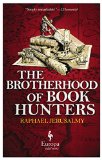Summary | Excerpt | Reviews | Beyond the book | Read-Alikes | Genres & Themes | Author Bio

David Maine is fast carving himself out a niche as an edgy
re-teller of biblical stories. First came his interpretation of Noah's Ark
(titled The Preservationist in the USA and The Flood in the UK:
2004), in which a brooding Yahweh takes a Sicilian approach to his creation
sending all but but his favored family to sleep with the fishes. Then came
Fallen (2005) in which the Bible's first family recount their tales of
woe in reverse chronological order, shifting viewpoints from Cain to Abel to
Adam, and lastly to Eve.
Now he returns with The Book of Samson - a rip-roaring and audacious
interpretation of the life of Samson, the Herculean hero of the Israelites famed
for his big hair, huge strength, weakness for the ladies and ability to kill
3000 in a day with the jawbone of a donkey. It's a fantastically
entertaining read as is, but there's also a strong theme running through the
text that puts a modern twist on this old tale.
It goes without saying that Delilah's betrayal of Samson is key to the
story. However, the central theme is not sexual betrayal but of violence
committed in the name of God. When reading the biblical account it's easy
to brush over the body count, but Maine's Samson is happy to report with pride
the details of his killings, because he never doubts in the slightest that he is
entirely in the right; and when one reads his story (in Maine's version, or in
Judges 13-16) it's not difficult to see why he would have that impression -
after all, if one was to go out and kill 3000 in a day and then find oneself a
bit thirsty, and God then delivered up a fresh stream to quench said thirst (Judges
15:19) one might have the impression that God was pleased!
The Book of Samson sticks closely to the story as told in Judges, but
expands on it with vivid period detail and stories that aren't Biblically
recorded but fit the mold. For example, according to Judges 15:20 "Samson
led Israel for twenty years in the days of the Philistines," but there is no
mention of what sort of Judge he was. Not to worry, Maine is happy to fill
in this biblical gap with a few choice stories that fit his vision of Samson.
For example, Samson proudly relates how he solved a tricky judicial case
(similar to that faced by Solomon later on, but solved with substantially more
finesse and less blood by Solomon: 1 Kings 4). A divorced couple come to
Samson both claiming custody of their child; Samson listens to their arguing to
and fro until his head hurts and then, without warning the parents of his
decision, picks up his sword and cleaves the baby in two, handing one half to
each parent: Problem solved, message sent.
Undoubtedly, Samson is a lout of the first order with well developed
psychopathic tendencies, but despite this it's difficult not to like him.
Yes, he's a thug but he's also plainspoken and able to see his shortcomings in
almost every area of his life, except when it comes to his zeal.
He is well aware of his place in the world - before he was born the
Israelites had once again incurred the wrath of God by falling into immoral
ways, and as punishment have been delivered into the hands of the Philistines
for forty years. Like a number of other Biblical figures, Samson is born to a formerly childless woman who is
ordered by an angel to bring him up in a particular way - in Samson's case as a Nazarite (see sidebar). Thus he grows up in the
knowledge that he is something special, and the only thing stronger than his
physical strength is his belief in his own righteousness.
Even as
the Israelites wake up to the realization that their hero is a a bit of a
liability and disown him, his zeal amplifies.
Nothing will shift him from his path, and he is quite incapable of seeing any
other point of view but his own; when his Philistine interrogator asks him why
it was necessary for the Israelites to sack the Canaanite's cities, raze their
farms and kick down the walls of Jericho, Samson zones out imagining all the
battles he missed before he was born and then, shaking himself back to the
present, replies, "Only the One True God can answer your questions .... He
ordained it and He's the only one who can make clear His motives."
As the reviewer for Kirkus puts it, "Samson speaks of the strange buzzing he
hears when he kills so righteously and the speed and strength given to him by
God to murder. It is chilling indeed when the line between hero and serial
killer is blurred."
Notes: Maine has written The Book of Samson with an alarming dearth of punctuation. While this is not an impediment to understanding, those who feel strongly about the correct use of commas and the like are forewarned!
All the characters and place names in The Book of Samson are taken from
the 1914 printing of the Douay Bible (used mainly by the Catholic church), hence
you may notice differences in spellings, such as Dalila versus the more common
spelling of Delilah.
![]() This review was originally published in The BookBrowse Review in January 2007, and has been updated for the
November 2007 edition.
Click here to go to this issue.
This review was originally published in The BookBrowse Review in January 2007, and has been updated for the
November 2007 edition.
Click here to go to this issue.

If you liked The Book of Samson, try these:

The Brotherhood of Book Hunters
by Raphael Jerusalmy
Published 2014
A riveting tale of plots and counter-plots that takes place in Jerusalem, France, and Italy in the time of Louis XI.

by Alice Hoffman
Published 2012
Over five years in the writing, The Dovekeepers is Alice Hoffman's most ambitious and mesmerizing novel, a tour de force of imagination and research, set in ancient Israel.
Who dares to teach must never cease to learn.
Click Here to find out who said this, as well as discovering other famous literary quotes!
Your guide toexceptional books
BookBrowse seeks out and recommends the best in contemporary fiction and nonfiction—books that not only engage and entertain but also deepen our understanding of ourselves and the world around us.